China and South Africa jointly held the 2nd Standard Formulation Seminar on the Construction for BRICS Technology
and Skill Standardization to Facilitate BRICS Standardization Development
- Date:
2024/6/18 11:43:01 - Author:BRICS Skills Standardization Working Committee
- Visits: 4874
From May 25 to 27, the 2nd Standard Formulation Seminar on the Construction for BRICS Technology and Skill Standardization to Facilitate BRICS Standardization Development was successfully held at BRICS Academy of Skills Development and Technology Innovation (Xiamen).
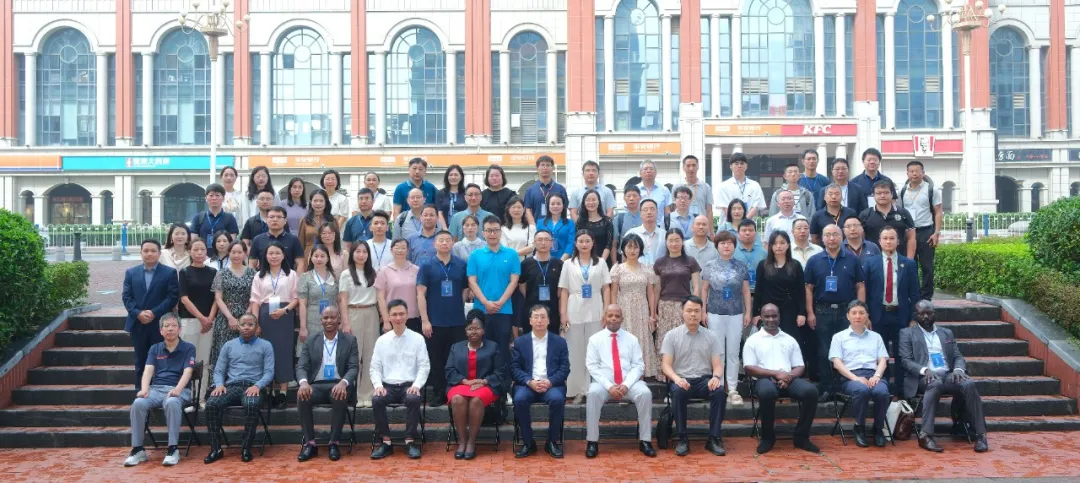 The training was hosted by BRICS Skills andTechnology Standardization Working Committee, Technical Committee 2 on BRICS Technology and Skills of Standardization Administrationin Xiamen, China ( SAXM/TC2 )and International Alliance of Skills Development (IASDBR). It attracted more than 100 scholars,experts, entrepreneurs, etc. from 66 vocational colleges, scientific research institutions, and enterprises across the country to participate in the training.
The training was hosted by BRICS Skills andTechnology Standardization Working Committee, Technical Committee 2 on BRICS Technology and Skills of Standardization Administrationin Xiamen, China ( SAXM/TC2 )and International Alliance of Skills Development (IASDBR). It attracted more than 100 scholars,experts, entrepreneurs, etc. from 66 vocational colleges, scientific research institutions, and enterprises across the country to participate in the training.
Dr. Liu Zhenying, Chairman of the Skill Development, Applied Technology and Innovation Working Group of the BRICS Business Council (China), Chairman of the Belt and Road and BRICS Skill Development International Alliance, and president of BRICS Academy of Skills Development and Technology Innovation (Xiamen) , Mr. Zukile Mvalo, Deputy Director General of the South African Department of Higher Education and Training, Ms. Mapule Ncanywa, Chairman of the Skill Development, Applied Technology and Innovation Working Group of the BRICS Business Council (South Africa), and Mr. Wang Zhijun, Deputy Director of the Standardization Department of Xiamen Market Supervision Administration, attended the opening ceremony and delivered speeches.

Professor Zhao Zhiqun, professor of the School of Education at Beijing Normal University, PhD student in Germany, doctoral supervisor, and chairman of the board of directors of the International Innovative Apprenticeship Research Network (INAP); Professor Mpilo Ngubane, Chief Learning Officer of Durban Municipal College and Executive Director of the United Nations Institute for Training and Research-Global Training Center Network Durban; Dr. Dovhani Mamphiswana, CEO of Ikurhuleni Artisan and Skills Training Institute in South Africa; Mr. Sanele Goodenough Makinane, Project Manager of Strategic Projects of the Skill Development, Applied Technology and Innovation Working Group of the BRICS Business Council (South Africa) and Chief Operating Officer of the South African Science and Technology Center; Mr. Mxolisi Benson Magagula, Administrative Assistant and Project Manager of the Skill Development, Applied Technology and Innovation Working Group of the BRICS Business Council (South Africa); Director Zhou Junyao of the Digital Economy Center of the Jimei District Industry and Information Technology Bureau; Senior Engineer Huang Shunda, winner of the 2022 IEC1906 Award, registered expert and two-way liaison of IEC/TC40 and IEC/TC33, and others attended the event.
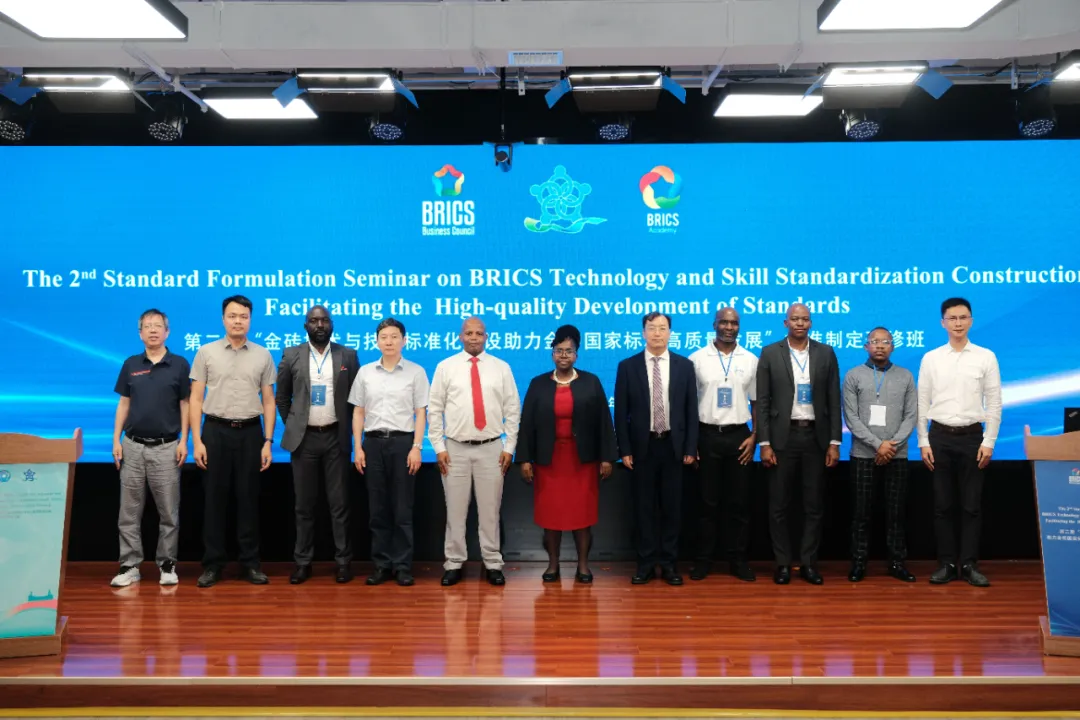
Dr. Liu Zhenying introduced the relevant situation of the BRICS Skills and Technology Standardization Working Committee and the Xiamen BRICS Technology and Skills Standardization Technical Committee to the trainees, as well as the achievements of the standard work since its establishment and the next work plan. First, in terms of standard release, the BRICS Skills and Technology Standardization Working Committee of the BRICS Business Council Skills Development and Technology Innovation Working Group officially released the BRICS group competition standards, skill standards and curriculum standards for machine learning and big data, and used and promoted them in the BRICS competition. Second, in terms of BRICS standard seminars, this year's BRICS rotating presidency Russia's Skills Development and Technology Innovation Working Group entrusted China to continue to lead the organization of BRICS standardization work, and in the first quarter, completed the competition standard formulation seminar for 13 events of the Future Skills Challenge hosted by Russia. In the 13 seminars, more than 300 experts from different fields of BRICS countries exchanged views online and shared experiences from various countries. Third, in terms of the establishment of standard-setting working groups, the BRICS Skills and Technology Standardization Working Committee established 10 new standard-setting working groups in the first half of this year, including: building information modeling, Internet of Things, industrial design technology, augmented and virtual reality, blockchain, business digital capabilities, robotic process automation, additive manufacturing, drone operation, data analysis and visualization. All projects are also advancing the standard writing work according to the established plan, and are expected to be released in the first half of next year. Fourth, in terms of standard platform construction, the construction of the BRICS group standard information platform has been completed, and the Chinese and English versions of the website have entered the trial operation stage. Important links such as standard project establishment, opinion collection, standard release, and standardization activities will be presented on the platform. Fifth, in terms of research topics, it is planned to explore the working mechanism and path methods of mutual recognition of standardization among BRICS countries. By analyzing the domestic standardization construction of BRICS countries, establishing a normalized cooperation and exchange mechanism among countries, and cooperation between international standards and group standards, we will promote mutual recognition of standardization among BRICS countries. Sixth, in terms of the promotion of Xiamen standards to BRICS standards, we will select advanced technical standards from the published Xiamen technical standards and further upgrade them to BRICS group standards to help Xiamen standards go global. At the same time, with the support of Xiamen Market Supervision and Administration Bureau and Xiamen BRICS Office, we have accumulated the experience of BRICS competitions into standards and formulated the "BRICS Vocational Skills Competition Organization Service Specifications". Dr. Liu Zhenying said that we will further deepen and implement the relevant work of the standards, effectively implement each work, make achievements and highlights, and solidly support the construction of the BRICS New Industrial Revolution Partnership Innovation Base.

Deputy Director General Zukile Mvalo affirmed the excellent achievements made by the (Chinese) Skill Development and Technology Innovation Group in recent years, and said: First, he affirmed the importance of the BRICS group standard-setting work, which is conducive to improving the voice of BRICS countries including South Africa in the field of standards, and is conducive to improving the standardization level of BRICS countries in the fields of science and technology and vocational education, and is conducive to improving South Africa's high-quality development in the economic field and increasing employment rates. Second, he introduced that South Africa has reached cooperation intentions with 28 countries and regions including China, and hopes to form an expert team with experts, scholars and entrepreneurs in various fields in China to jointly carry out standard-setting work and jointly promote the standard-related work of the BRICS Skill and Technology Standardization Working Committee. Third, he expressed his sincere joy and gratitude for being able to participate in this standard-setting training course, and wished this event a complete success.

Mapule Ncanywa said that, first, the BRICS Skills and Technology Standardization Committee was established under the framework of the BRICS Skill Development and Technology Innovation Group, and the BRICS countries jointly carried out the standardization and revision work in the field of skills and technology, and further promoted the standardization process through continuous learning and exchanges between countries, and deepened and solidified the standardization work. Second, it focused on cooperation in multiple fields such as machine learning and big data, blockchain, additive manufacturing, industrial design technology, building information modeling, augmented and virtual reality, cross-border e-commerce, and e-commerce, and carried out business cooperation through the formulated standards. Third, it strengthened mutual visits and exchanges between BRICS countries, continued to promote the standardization work of the BRICS Standardization Committee, and provided important technical support for the younger generation of practitioners in South Africa through standard formulation and standard coordination, and also cultivated standardization talents in the future skills and technology fields for South Africa. Finally, he expressed his gratitude to all scholars, experts and entrepreneurs for their strong support, and to all colleagues for their efforts in the construction of skills and technology standardization.
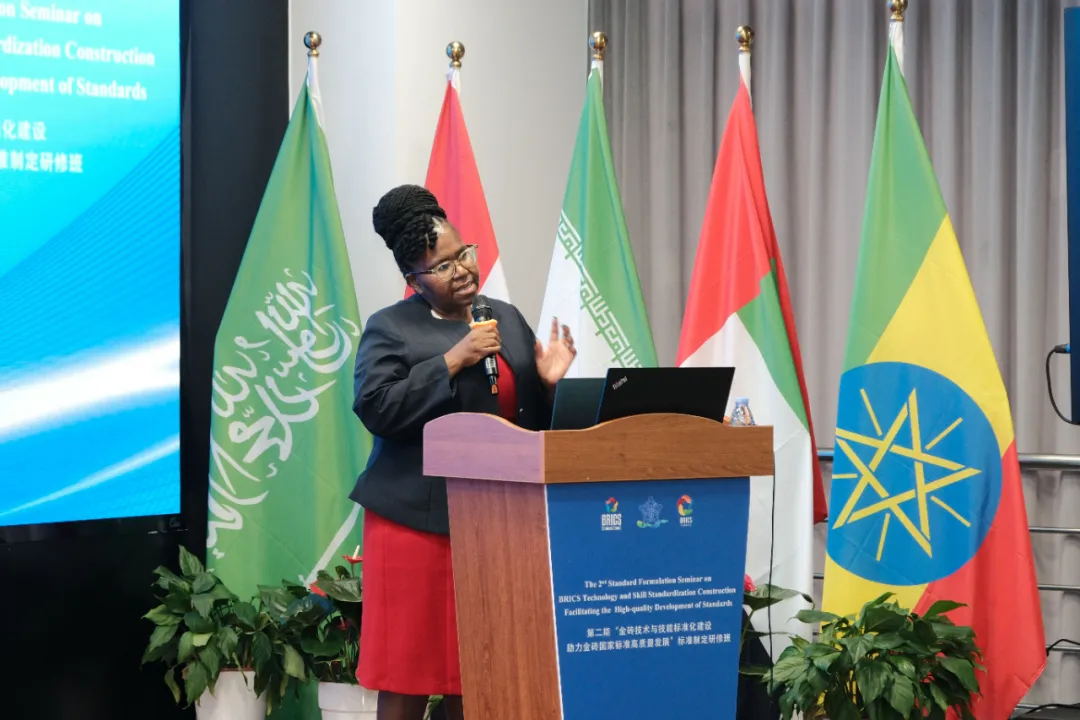
Wang Zhijun said that standardization cooperation is an important way for BRICS countries to deepen their partnership and achieve breakthrough results in BRICS cooperation. Since the Goa Declaration of the Eighth BRICS Summit in 2016, BRICS countries have been actively promoting standardization cooperation. At the same time, since the construction of the BRICS Innovation Base started in Xiamen in 2020, the Xiamen Municipal Party Committee and Municipal Government have attached great importance to the standardization cooperation among BRICS countries. In the "Implementation Opinions of Xiamen City on the Implementation of the National Standardization Development Outline", "standardization to help the construction of the BRICS Innovation Base" is regarded as an important task. As the city's standardization authority, the Xiamen Municipal Market Supervision Administration actively promotes standardization exchanges and cooperation among BRICS countries. First, it formulates standardization funding support measures to encourage enterprises in the city to participate in the formulation and revision of standards in other BRICS countries, and encourages enterprises in Xiamen from other BRICS countries to actively participate in the formulation and revision of relevant standards in my country. Second, it strives for the support of the National Standard Technical Review Center to set up an international standard service station in Xiamen to serve the construction of the BRICS Innovation Base, becoming the only authorized international standard service platform in the southeast region, and has built national standard databases for India, Russia, Brazil and South Africa.
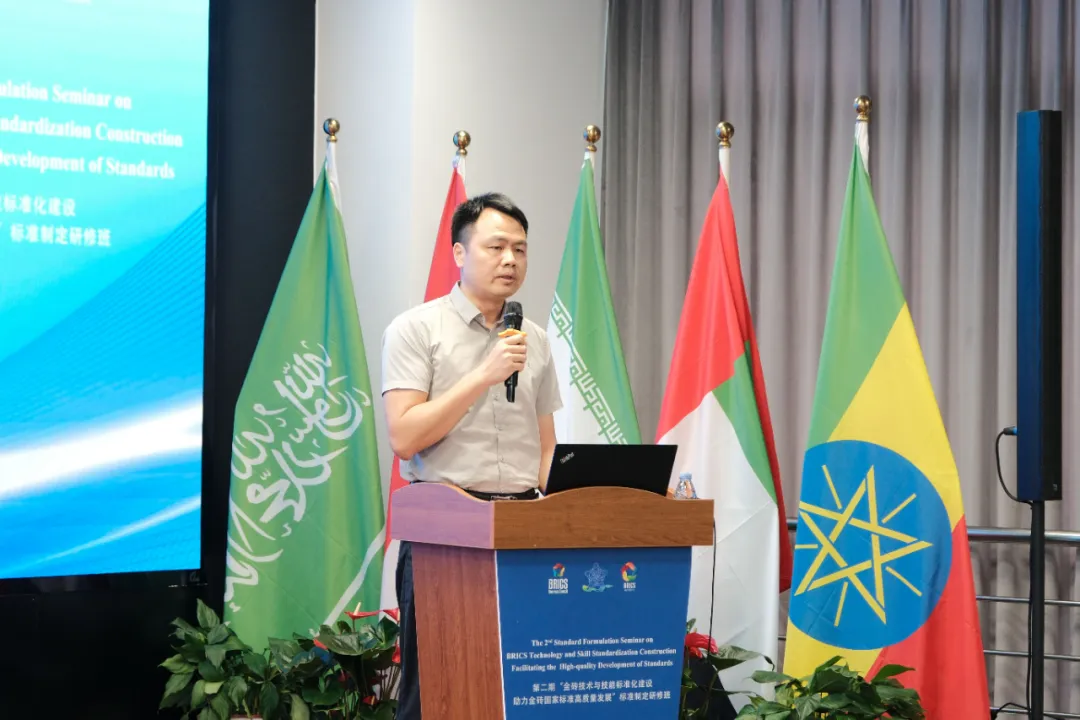
Frederico Lamego Soares, Chairman of the Skill Development, Applied Technology and Innovation Working Group of the BRICS Business Council (Brazil) and Director of International Business of the Brazilian National Industrial Training Service, Vineet Raj Kapoor, President of India's SXILL Academy of Experience, Fantasy and Life Learning and Founder and Dean of the Chandigarh School of Design, Marco A. Cabero Z., President of the Andean National Science and Technology Organization, Mamudu Hamidu, lecturer at Kumasi Technical University and former Technical Representative of the Republic of Ghana to the WorldSkills Organization, and other international experts from the BRICS Skills and Technology Standardization Working Committee attended the event online and delivered speeches.




During the training event, the BRICS Business Council (China) Skill Development, Applied Technology and Innovation Working Group, the BRICS Business Council (South Africa) Skill Development, Applied Technology and Innovation Working Group and the Durban Municipal College in South Africa; the BRICS Business Council (China) Skill Development, Applied Technology and Innovation Working Group, the BRICS Business Council (South Africa) Skill Development, Applied Technology and Innovation Working Group and the Ekurhuleni Artisan and Skill Training Institute in South Africa signed the "Memorandum of Understanding on China-South Africa Cooperation Projects" to jointly promote the formulation/mutual recognition of bilateral standards between China and South Africa, the construction of the BRICS Future Technology Skills and Cultural Exchange Talent International Training Base (BRICS Workshop), the mutual recognition of credits between Chinese and South African colleges and universities, and joint schooling. Dr. Liu Zhenying, Chairman Mapule Ncanywa, Professor Mpilo Ngubane, and Dr. Dovhani Mamphiswana signed the memorandum of understanding as signing representatives.


Keynote Speech:



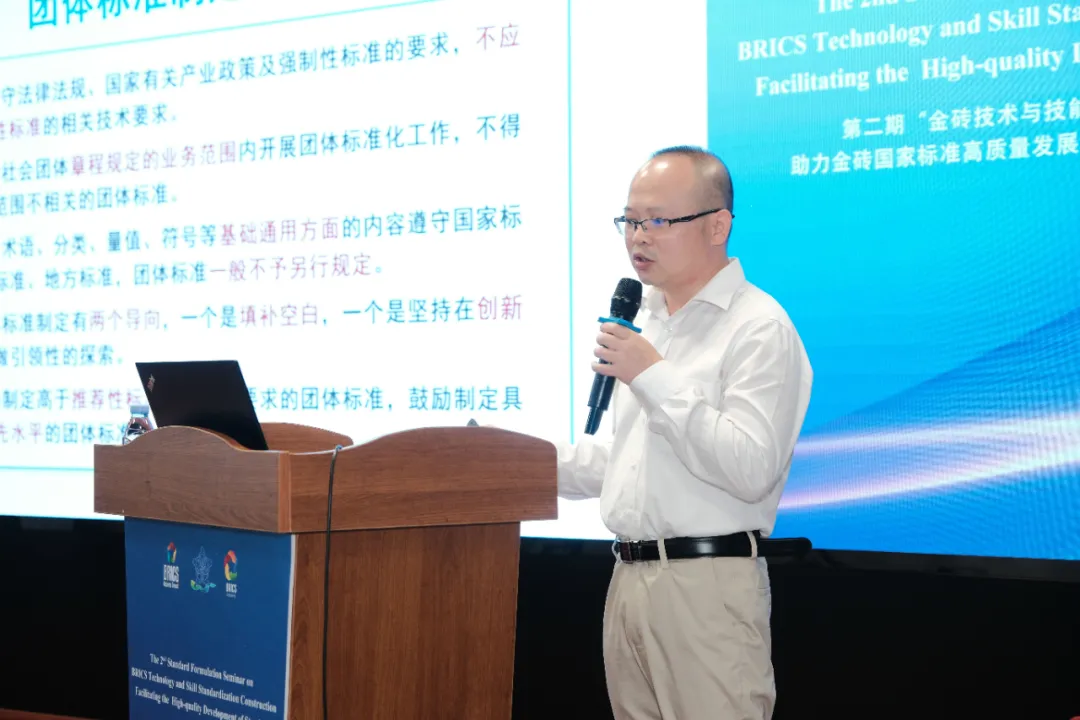

The purpose of this training activity of the standard setting seminar is to implement the deployment of the 20th National Congress of the Communist Party of China to "expand the influence of cooperation mechanisms such as BRICS and the Shanghai Cooperation Organization" and "steadily expand institutional openness such as rules, regulations, management, and standards", as well as the spirit of the "National Standardization Development Outline" to "strengthen standardization dialogue among BRICS countries, promote standard information sharing and services, and develop mutually beneficial and win-win standardization cooperation partnerships". It will help standardization workers such as enterprises and vocational schools to accurately understand standards and standardization, master standardization methodology and methods of standard system construction, standard formulation and review, promote the overall improvement of the quality of standardization work, help enterprises and vocational schools go international from the perspective of standards, promote high-quality social and economic development, and help build the BRICS New Industrial Revolution Partnership Innovation Base.

The trainees spoke highly of the training, and said that through the standard-setting training, they had established clearer concepts and ideas for related work. Next, they will devote themselves to the formulation of BRICS group skill standards, so that the BRICS standards can benefit a wider range of enterprises, colleges and universities and other groups, and help the high-quality development of BRICS countries in the fields of economy, science and technology.



 闽公网安备 355885854552266号
闽公网安备 355885854552266号